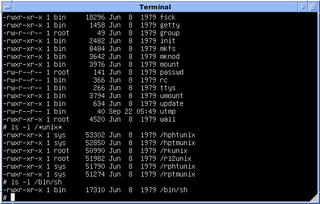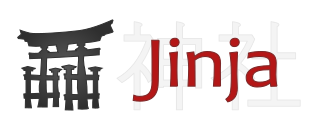
Common Lisp (CL) is a dialect of the Lisp programming language, published in American National Standards Institute (ANSI) standard document ANSI INCITS 226-1994 (S20018). The Common Lisp HyperSpec, a hyperlinked HTML version, has been derived from the ANSI Common Lisp standard.

LaTeX is a software system for typesetting documents. LaTeX markup describes the content and layout of the document, as opposed to the formatted text found in WYSIWYG word processors like Microsoft Word, LibreOffice Writer and Apple Pages. The writer uses markup tagging conventions to define the general structure of a document, to stylise text throughout a document, and to add citations and cross-references. A TeX distribution such as TeX Live or MiKTeX is used to produce an output file suitable for printing or digital distribution.

A shell script is a computer program designed to be run by a Unix shell, a command-line interpreter. The various dialects of shell scripts are considered to be scripting languages. Typical operations performed by shell scripts include file manipulation, program execution, and printing text. A script which sets up the environment, runs the program, and does any necessary cleanup or logging, is called a wrapper.
troff, short for "typesetter roff", is the major component of a document processing system developed by Bell Labs for the Unix operating system. troff and the related nroff were both developed from the original roff.

A man page is a form of software documentation usually found on a Unix or Unix-like operating system. Topics covered include computer programs, formal standards and conventions, and even abstract concepts. A user may invoke a man page by issuing the man command.

The Bourne shell (sh) is a shell command-line interpreter for computer operating systems.
In software development, Make is a build automation tool that builds executable programs and libraries from source code by reading files called makefiles which specify how to derive the target program. Though integrated development environments and language-specific compiler features can also be used to manage a build process, Make remains widely used, especially in Unix and Unix-like operating systems.
The C preprocessor is the macro preprocessor for several computer programming languages, such as C, Objective-C, C++, and a variety of Fortran languages. The preprocessor provides inclusion of header files, macro expansions, conditional compilation, and line control.
In computing, a polyglot is a computer program or script written in a valid form of multiple programming languages or file formats. The name was coined by analogy to multilingualism. A polyglot file is composed by combining syntax from two or more different formats.

CUPS is a modular printing system for Unix-like computer operating systems which allows a computer to act as a print server. A computer running CUPS is a host that can accept print jobs from client computers, process them, and send them to the appropriate printer.

Doxygen is a documentation generator and static analysis tool for software source trees. When used as a documentation generator, Doxygen extracts information from specially-formatted comments within the code. When used for analysis, Doxygen uses its parse tree to generate diagrams and charts of the code structure. Doxygen can cross reference documentation and code, so that the reader of a document can easily refer to the actual code.
In computer programming, glob patterns specify sets of filenames with wildcard characters. For example, the Unix Bash shell command mv *.txttextfiles/ moves all files with names ending in .txt from the current directory to the directory textfiles. Here, * is a wildcard and *.txt is a glob pattern. The wildcard * stands for "any string of any length including empty, but excluding the path separator characters ".
m4 is a general-purpose macro processor included in most Unix-like operating systems, and is a component of the POSIX standard.
Source Code Control System (SCCS) is a version control system designed to track changes in source code and other text files during the development of a piece of software. This allows the user to retrieve any of the previous versions of the original source code and the changes which are stored. It was originally developed at Bell Labs beginning in late 1972 by Marc Rochkind for an IBM System/370 computer running OS/360.
The Perl Object Environment (POE) is a library of Perl modules written in the Perl programming language by Rocco Caputo et al.
HeaderDoc is a documentation generator developed and maintained by Apple Inc. Using specially commented source code files as input, HeaderDoc generates documentation for the code in HTML or XML format. Syntax for HeaderDoc comment tags is largely similar to, and as of HeaderDoc version 8, supportive of Javadoc tags. HeaderDoc 8.7 and later also provides partial support for many Doxygen tags. Apple's HeaderDoc project is free, open source software distributed under the Apple Public Source License.

Jinja is a web template engine for the Python programming language. It was created by Armin Ronacher and is licensed under a BSD License. Jinja is similar to the Django template engine but provides Python-like expressions while ensuring that the templates are evaluated in a sandbox. It is a text-based template language and thus can be used to generate any markup as well as source code.
In computer programming, boilerplate code, or simply boilerplate, are sections of code that are repeated in multiple places with little to no variation. When using languages that are considered verbose, the programmer must write a lot of boilerplate code to accomplish only minor functionality.
mandoc is a utility used for formatting man pages in BSD Operating Systems, specifically those written in the mdoc and man macro languages. Unlike the groff and older troff and nroff tools that are predominantly used for this purpose by tools such as man, mandoc focuses specifically on manuals and is not suitable for general-purpose type-setting.
The following outline is provided as an overview of and topical guide to the Perl programming language:







